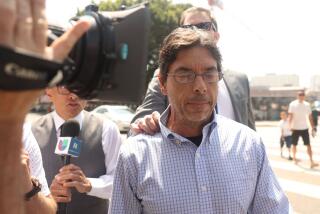Dentist Pleads No Contest in Death After Anesthesia : Medicine: Similar manslaughter charge involving a second patient is dropped in a plea bargain.
- Share via
A former Pacific Beach dentist pleaded no contest Monday to a manslaughter charge in the death of a patient who lapsed into a coma after receiving anesthesia.
A charge involving a second patient who died under similar circumstances was dropped.
In a plea bargain, Roy Galen Slack, 74, pleaded no contest to one count of involuntary manslaughter in the death of O’Neal Woods, 36, of Mission Valley, who slipped into a coma during a tooth extraction and died two weeks later, on June 26, 1989, Deputy Dist. Atty. Robert Madruga said.
In exchange for the plea, a count of involuntary manslaughter in the death of a Southeast San Diego woman was dropped, Madruga said. Gloria Davis, 58, died June 14, 1988, after falling into a coma during oral surgery by Slack five days earlier.
Slack’s sentencing is scheduled for May 20 in Superior Court. He faces a maximum of one year in prison, a $10,000 fine and restitution to the families of both victims, Madruga said. He is free on his own recognizance.
Another condition of the plea bargain is that Slack, who retired in 1989 after Woods’ death, cannot practice dentistry again, Deputy Dist. Atty. Rori Robinson said Tuesday.
“At some point, we’re going to ask that his license be surrendered,” Robinson said, adding that she expects no opposition from Slack on the request.
Woods, a restaurant cook, never regained consciousness during the two weeks he spent in Mission Bay Hospital after the extraction, said Max Murphy, an investigator in the county medical examiner’s office.
Davis fell into a coma June 9, 1988, after undergoing general anesthesia and having five teeth extracted, Murphy said. She was awakened briefly but remained comatose for most of the five days before her death at Mission Bay Hospital, he said.
Difficulty in proving to what extent the patients may have been overdosed with anesthesia--particularly since both were treated by paramedics at the scene and kept on life support for days after their surgery--contributed to the district attorney’s plea-bargain offer, Madruga said.
Robinson said other factors contributed as well. Prosecutors said they did not think Slack would receive a prison term for either death because they were accidental.
“We didn’t think that any prison time would be given to this individual based on his age and the circumstances surrounding the death, his past clean record . . . “ Robinson said. “This was not an intentional death.”
Nevertheless, Madruga maintained that Slack did not take proper precautions in administering general anesthesia to the two “medically compromised” patients.
On a questionnaire during her initial visit, Davis indicated that she had a heart condition, high blood pressure, was undergoing kidney dialysis and was allergic to barbiturates, Madruga said.
He said Davis was anesthetized with fluothane gas and nitrous oxide in addition to receiving barbiturates.
Woods, who reported high blood pressure and a previous stroke, was injected with the drug Brevitol in addition to receiving fluothane and nitrous oxide, he said.
“The second reason for the gross negligence charges is that (Slack) did not use any type of monitoring device during general anesthesia,” Madruga said. “He relied on his own visual observations.”
Slack’s attorney, Peter Hughes, countered that Slack’s practice relied heavily on referrals from other practitioners and that he would not have been able to stay in business without taking proper precautions.
“When somebody does 40,000 of these things, he develops a certain amount of skill and perception at it,” Hughes said. “And that just doesn’t jibe with being a sloppy practitioner.”
Slack’s practice was essentially a referral business, Hughes said, with many patients being referred because of their inability to pay. Davis was referred by a dental group and and Woods by another dentist, he said.
“He was one of the few oral surgeons who was willing to take indigent or borderline indigent cases,” Hughes said. “Through the years, he has done 30,000 to 40,000 of these type of operations and was highly regarded as an oral surgeon.”
More to Read
Sign up for Essential California
The most important California stories and recommendations in your inbox every morning.
You may occasionally receive promotional content from the Los Angeles Times.
![Vista, California-Apri 2, 2025-Hours after undergoing dental surgery a 9-year-old girl was found unresponsive in her home, officials are investigating what caused her death. On March 18, Silvanna Moreno was placed under anesthesia for a dental surgery at Dreamtime Dentistry, a dental facility that "strive[s] to be the premier office for sedation dentistry in Vitsa, CA. (Google Maps)](https://ca-times.brightspotcdn.com/dims4/default/8c153ef/2147483647/strip/true/crop/2010x1344+32+0/resize/320x214!/quality/75/?url=https%3A%2F%2Fcalifornia-times-brightspot.s3.amazonaws.com%2F78%2Ffd%2F9bbf9b62489fa209f9c67df2e472%2Fla-me-dreamtime-dentist-01.jpg)











